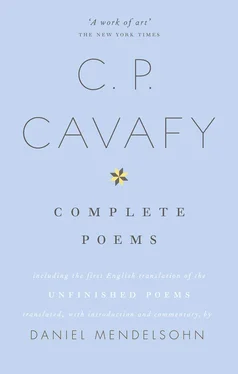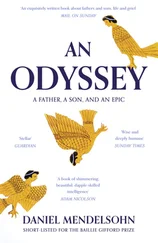So Alexander the sophist
writes Herodes a letter
requesting that he send back the Greeks.
And smooth Herodes swiftly responds,
“I too am coming, along with the Greeks.”
How many lads in Alexandria now,
in Antioch, or in Beirut
(tomorrow’s orators, trained by Greek culture)
when they gather at choice dinner parties
where sometimes the talk is of fine intellectual points,
and sometimes about their exquisite amours,
suddenly, abstracted, fall silent.
They leave their glasses untouched at their sides,
and they ponder the luck of Herodes—
what other sophist was honored like this?—
whatever he wants and whatever he does
the Greeks (the Greeks!) follow him,
neither to criticize nor to debate,
nor even to choose any more; just to follow.
[ 1900 ; 1911 ; 1912]
As you will have heard, I’m no beginner.
Lots of stone has passed between my hands.
And in Tyana, my native land,
they know me well. And here the senators
commission many statues.
Let me show
a few to you right now. Notice this Rhea;
august, all fortitude, quite archaic.
Notice the Pompey. The Marius,
the Aemilius Paullus, and the African Scipio.
The likenesses, as much as I was able, are true.
The Patroclus (I’ll touch him up soon).
Near those pieces of yellowish
marble there, that’s Caesarion.
And for some time now I’ve been involved
in making a Poseidon. Most of all
I’m studying his horses: how to mold them.
They must be rendered so delicately that
it will be clear from their bodies, their feet,
that they aren’t treading earth, but racing on water.
But this work here is my favorite of all,
which I made with the greatest care and deep feeling:
him, one warm day in summer
when my thoughts were ascending to ideal things,
him I stood dreaming here, the young Hermes.
[ 1893 ; 1903 ; 1911]
The Tomb of Lysias the Grammarian
Just there, on the right as you go in,
in the Beirut library we buried him:
the scholar Lysias, a grammarian.
The location suits him beautifully.
We put him near the things that he
remembers maybe even there—glosses, texts,
apparatuses, variants, the multivolume works
of scholarship on Greek idiom. Also, like this,
his tomb will be seen and honored by us
as we pass by on our way to the books.
[ 1911 ; 1914]
Inside of this elaborate memorial,
made entirely of syenite stone,
which so many violets, so many lilies adorn,
Eurion lies buried, so beautiful.
A boy of twenty-five, an Alexandrian.
Through the father’s kin, old Macedonian;
a line of alabarchs on his mother’s side.
With Aristoclitus he took his philosophical instruction;
rhetoric with Parus. A student in Thebes, he read
the sacred writings. He wrote a history
of the Arsinoïte district. This at least will endure.
Nevertheless we’ve lost what was most dear: his beauty,
which was like an Apollonian vision.
[ 1912 ; 1914]
Unknown, the Edessene—a stranger here in Antioch—
writes a lot. And there, at last, the final canto has
appeared. Altogether that makes eighty-three
poems in all. But the poet is worn out
from so much writing, so much versifying,
the terrific strain of so much Greek phrasing,
and every little thing now weighs him down.
A sudden thought, however, pulls him out
of his dejection—the exquisite “That is he”
which Lucian once heard in a dream.
[ 1898 ; 1909]
Said Myrtias (a Syrian student
in Alexandria; during the reign
of the augustus Constans and the augustus Constantius;
partly pagan, and partly Christianized):
“Strengthened by contemplation and study,
I will not fear my passions like a coward.
My body I will give to pleasures,
to diversions that I’ve dreamed of,
to the most daring erotic desires,
to the lustful impulses of my blood, without
any fear at all, for whenever I will—
and I will have the will, strengthened
as I’ll be with contemplation and study—
at the crucial moments I’ll recover
my spirit as it was before: ascetic.”
[ ? ; 1911]
The emperor Lord Manuel Comnenus
one melancholy morning in September
sensed that death was near. The court astrologers
(those who were paid) were nattering on
that he had many years left yet to live.
But while they went on talking, the king
recalls neglected habits of piety,
and from the monastery cells he orders
ecclesiastical vestments to be brought,
and he puts them on, and is delighted
to present the decorous mien of a priest or friar.
Happy are all who believe,
and who, like the emperor Lord Manuel, expire
outfitted most decorously in their faith.
[ 1905 ; 1916]
I love the church—its labara,
the silver of its vessels, its candelabra,
the lights, its icons, its lectern.
When I enter there, inside of a Greek Church:
with the aromas of its incenses,
the liturgical chanting and harmonies,
the magnificent appearance of the priests,
and the rhythm of their every movement—
resplendent in their ornate vestments—
my thoughts turn to the great glories of our race,
to our Byzantium, illustrious.
[ 1892 ; 1901 ; 1906 ; 1912?]
He’s an old man. Worn out and stooped,
crippled by years, and by excess,
stepping slowly, he moves along the alleyway.
But when he goes inside his house to hide
his pitiful state, and his old age, he considers
the share that he— he —still has in youth.
Youths recite his verses now.
His visions pass before their animated eyes.
Their healthy, sensuous minds,
their well-limned, solid flesh,
stir to his own expression of the beautiful.
[ 1911 ; 1913]
He wrapped them up carefully, neatly
in green silken cloth, very costly.
Roses from rubies, pearls into lilies,
amethyst violets. Lovely the way that he sees,
and judges, and wanted them; not in the way
he saw them in nature, or studied them. He’ll put them away,
in the safe: a sample of his daring, skillful work.
Whenever a customer comes into the store,
he takes other jewels from the cases to sell—fabulous things—
bracelets, chains, necklaces, rings.
[ 1912 ; 1913]
To my craft I am attentive, and I love it.
But today I’m discouraged by the slow pace of the work.
My mood depends upon the day. It looks
increasingly dark. Constantly windy and raining.
What I long for is to see, and not to speak.
In this painting, now, I’m gazing at
a lovely boy who’s lain down near a spring;
it could be that he’s worn himself out from running.
What a lovely boy; what a divine afternoon
has caught him and put him to sleep.—
Like this, for some time, I sit and gaze.
And once again, in art, I recover from creating it.
Читать дальше












